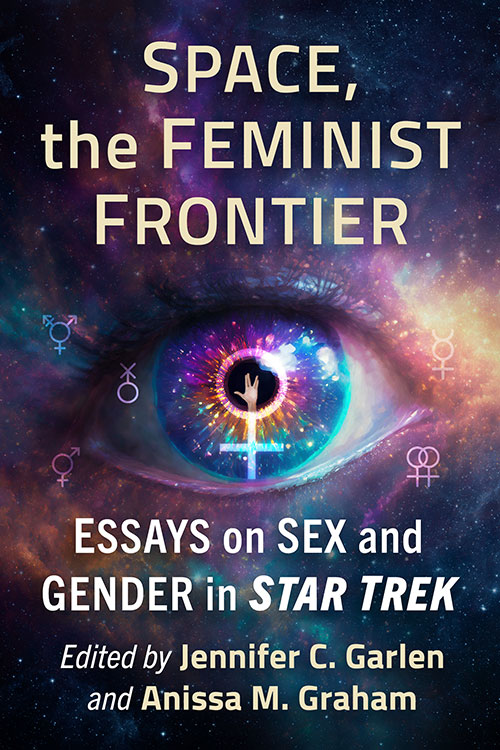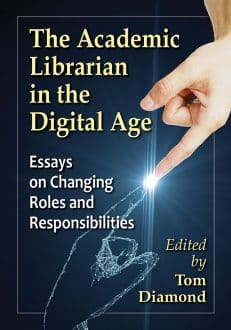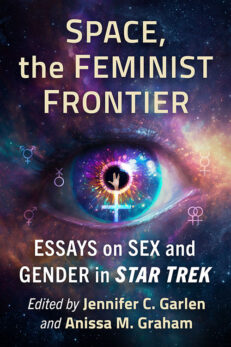Space, the Feminist Frontier
Essays on Sex and Gender in Star Trek
$55.00
In stock
About the Book
For nearly 60 years, Star Trek has imagined humanity’s future while reflecting its present. Star Trek: The Original Series debuted with three male leads, but in the wake of a Trek renaissance that began with Star Trek: Discovery in 2017, additional series have explored the frontiers of representation, making the present moment ripe for new critical engagement and thoughtful reflection on the narratives that have shaped the journey thus far.
Using the lens of feminist criticism and theory, this collection of essays presents a diverse array of academic and fan scholars engaging with the past, present, and future of Star Trek. Contributors consider issues like Klingon marriage, Majel Barrett’s legacy, the Bechdel-Wallace test, LGBTQ+ representation, and more. They offer updated readings on legacy characters while also addressing wholly new characters like Michael Burnham, Beckett Mariner, and Adira Tal. Their essays provide some of the first critical examinations of the newest additions to the Trek franchise, including Picard, Strange New Worlds and Lower Decks.
About the Author(s)
Bibliographic Details
Edited by Jennifer C. Garlen and Anissa M. Graham
Format: softcover (6 x 9)
Pages: 265
Bibliographic Info: appendices, bibliographies, index
Copyright Date: 2024
pISBN: 978-1-4766-9334-7
eISBN: 978-1-4766-5353-2
Imprint: McFarland
Table of Contents
Introduction: Dispatches from the Feminist Frontier
Jennifer C. Garlen and Anissa M. Graham 1
I. The Motherland: Matriarchs and Legacies
Female Power and Femininity in Majel Barrett’s Star Trek Characters
A.V. Rasmussen 13
“Are we ready or not?” Names and the Journey of Number One
Carey Millsap-Spears 27
How Nichelle Nichols’ Uhura Inspired the African American Female Character in Science Fiction
Sidney Blaylock, Jr. 38
Amanda Grayson and Interracial Mothering
Anissa M. Graham 52
II. Voyagers and Discoverers: The Next Generations
Resistance to Progress Is Futile: Feminism, Gender, and Seven of Nine
Holly Eva Allen 67
Gender, Marriage, and Remaining Klingon in “You Are Cordially Invited”
Zara T. Wilkinson 78
Michael Burnham and Intersectionality in Star Trek: Discovery
Janine Engelbrecht 95
Seven of Nine’s Return in Picard: Reidentifying and Reclaiming Humanity Through Hybridity
Bryana Fern 107
Parity and Parody on Lower Decks
Jennifer C. Garlen 124
III. Women’s Worlds: Female Experience and Representation
The Bechdel-Wallace Test Meets the Final Frontier
Jarrah Hodge 139
Lasting Images: Dr. Leah Brahms and the “Illusory Women” of Star Trek
Jacob Adler 155
Race, Gender, and “Nice Hispanic Girl” Imaginations in Star Trek
Brenda Selena Lara 167
Dealing with Trauma: The Feminist Progression of Suffering in Star Trek
Judith Clemens-Smucker 181
IV. New Frontiers: Beyond the Binary Boundary
Only a Link in a Chain: The Queer Lives of Joined Trill
Dylan Reid Miller 197
The Evolution of Non-Binary Characters from The Next Generation to Discovery
Finnian Burnett 208
Through a Glass Darkly: Queer and Queer Coded Villains in the Mirror Universe
Alison Waddy 219
Standing Up to Stigma: Destigmatizing the LGBTQ+ Experience in Star Trek: Enterprise
Zachary Kacmarynski and Darsa Donelan 232
Appendix A: Star Trek Television Series and Films in Chronological Order 243
Appendix B: Star Trek Episodes and Films Cited by Essay 245
About the Contributors 249
Index 253
Book Reviews & Awards
“Space, The Feminist Frontier: Essays on Sex and Gender in Star Trek is a welcome addition to scholarship on Star Trek in its various iterations. Several themes including the male gaze and non-binary characters are explored, and the book contains chapters on rarely explored characters, such as Nurse Chapel, Amanda Grayson, and Leah Brahms, as well as ones well studied, such as Uhura and Seven of Nine. Analysis of series, such as Lower Decks and Enterprise, that have received little critical study are a welcome addition.—Dr. Sherry Ginn, president, Popular Culture Association






